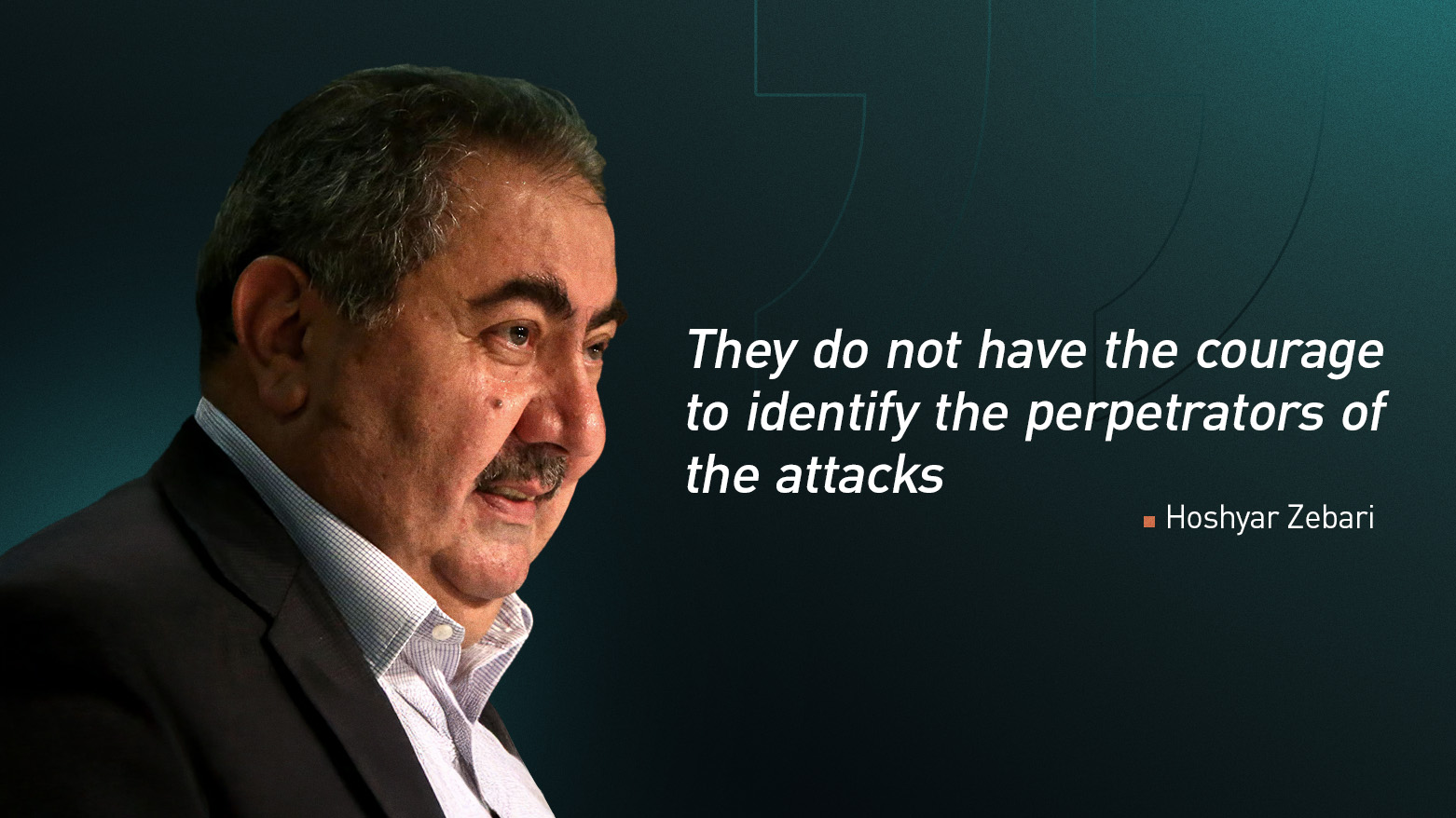Baghdad Lacks 'Courage' to Name Perpetrators of Drone Attacks on Kurdistan Region, Says Hoshyar Zebari
KDP senior official Hoshyar Zebari accuses the Iraqi government of lacking the "courage" to name the groups behind 38 drone attacks on the Kurdistan Region in July. He says Baghdad admits the attacks but fails to identify the perpetrators, continuing a pattern of inaction.

ERBIL (Kurdistan24) – A senior Kurdistan Democratic Party (KDP) official has accused the Iraqi federal government of lacking the "courage" to publicly identify the armed groups responsible for a systematic campaign of drone attacks against the Kurdistan Region's vital energy infrastructure and security installations. Hoshyar Zebari, a prominent member of the Kurdistan Democratic Party's (KDP) Politburo executive committee and a veteran statesman, asserted that while Baghdad has officially acknowledged the attacks in a report, it has failed to name the culprits, continuing a "repeated tradition" of forming investigative committees that yield no accountability.
In a statement posted on the social media platform X on Thursday, September 4, 2025, Zebari detailed the scale of the aggression, noting that armed groups operating inside Iraq launched 38 separate drone attacks against oil fields and infrastructure in the Kurdistan Region during the month of July alone. "The government of Iraq and its official and relevant parties have issued a report about this and have admitted to the attacks," Zebari wrote. However, he stated bluntly, "they do not have the courage to identify the perpetrators of the attacks on the Kurdistan Region."
في شهر تموز الماضي شنت الفصائل الولائية من داخل الأراض العراقية ٣٨ هجوما بالمسيرات المفخخة على بعض الابار النفطية و منشأت البنية التحتية في اقليم كردستان و شكلت الحكومة كالعادة لجنة تحقيقية لتقصي الحقائق. و صدر التقرير وأعترفت بالهجمات و لكنها لم تتجرأ على تسمية الجناة؟!!
— Hoshyar Zebari (@HoshyarZebari) September 4, 2025
Zebari's sharp critique comes after a month of sustained assaults that have targeted at least eight different oil fields, including Khurmala, Khor Mor, and Tawke, as well as airports and security forces across the region. The attacks have severely impacted the region's economy, forcing temporary shutdowns of oil production and instilling fear among international energy companies.
This campaign of aggression has been met with a series of high-level meetings and investigations, which Kurdish officials argue have consistently failed to produce tangible results.
On July 28, a high-level delegation from Baghdad, led by National Security Advisor Qasim al-Araji, visited Erbil to launch what was pledged to be a "final" joint investigation.
During a press conference with KRG Interior Minister Rebar Ahmed, al-Araji condemned the strikes, stating that they "damage the reputation and economy of Iraq," and vowed that "the attackers will receive their punishment." However, despite these public assurances, no group has been officially named or held accountable by the federal government.
This perceived inaction from Baghdad has been a source of deep and growing frustration for Kurdish leaders.
In a previous, extensive interview with the Iraqi Al-Sumaria channel in August, Zebari warned that Iraq was "on the verge of exploding" due to these attacks. He revealed at the time that joint investigations involving Kurdish, Iraqi, and Coalition forces had already determined that the drones were launched from areas under the control of the Popular Mobilization Forces (PMF), including the Nineveh Plains and the Rashad area of Kirkuk.
He described the perpetrators as "several groups conducting organized attacks" with the goal of "instilling fear in the oil production companies to make them withdraw."
The federal government's failure to act is now drawing increased scrutiny and pressure from the United States. On September 3, U.S. Representative Joe Wilson of South Carolina introduced a legislative amendment affirming the KRG as a vital strategic partner and calling on Baghdad to halt attacks carried out by "Iraqi militias funded by the Iraqi government."
The amendment explicitly states that "the United States supports providing the KRG with the necessary security measures so that the KRG can defend itself from attacks by Iran and its puppet militias against the KRG and its energy resources."
This move in the U.S. Congress reflects a hardening American stance, which Zebari had previously warned was a direct consequence of Baghdad's inaction. He had revealed that U.S. Secretary of State Marco Rubio sent a written message to Iraqi Prime Minister Mohammed Shia' al-Sudani, making it clear that Washington would not support the controversial PMF restructuring law.
According to Zebari, Baghdad's attempts to delay and prevaricate on these issues are causing "America's tone with Iraq" to escalate "into threats and sanctions, along with an end to security, military, and financial cooperation."
While the Iraqi Prime Minister has described the drone strikes as a "terrorist act" and pledged cooperation with Kurdish and Coalition partners, his administration has not formally identified the perpetrators. This stands in contrast to statements from Iraqi Parliament Deputy Speaker Shakhawan Abdullah, who confirmed in early August that the federal government possesses the identities of those responsible and is "aware of the groups they belong to."
In an interview with Asharq TV on July 27, 2025, Prime Minister Masrour Barzani also addressed the drone attacks on the Kurdistan Region's oil infrastructure, which disrupted production of 140,000–150,000 barrels per day—causing an estimated $10 million in daily losses.
“We know who is behind the attacks,” PM Barzani said, while noting that investigations are ongoing. “The United States is an ally, and we are sharing information with them, especially since American companies manage some of the affected fields.”
The continued failure to translate this knowledge into decisive action has left the Kurdistan Region in a precarious position. KRG officials have repeatedly warned that they will not remain silent and will take all necessary measures to defend themselves if the attacks persist.
The pattern of forming investigative committees without follow-up action, as highlighted by Hoshyar Zebari, has eroded trust and fueled perceptions that powerful, state-sanctioned militias are operating with impunity, further destabilizing an already fragile nation.
